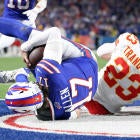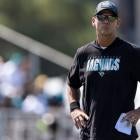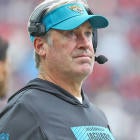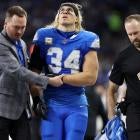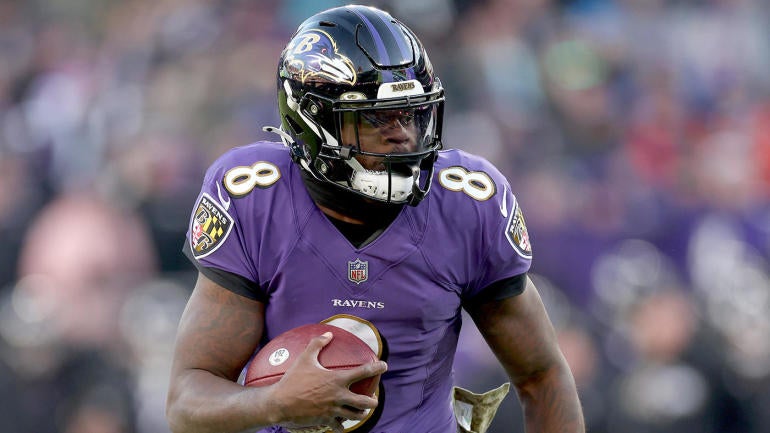
The Vikings have had one of the more curious offseasons since the start of the NFL's 2023 league year. Freshly removed from a surprise 13-4 debut under new coach Kevin O'Connell, second-year general manager Kwesi Adofo-Mensah has spent more time shedding familiar faces than restocking the lineup early in free agency. More than a week since the market opened, his most notable moves include a pricey deal for a backup tight end and a one-year flyer for ex-Saints first-rounder Marcus Davenport.
One area, in particular, however, feels more ripe for future change than normal: quarterback. Kirk Cousins has been the Vikings' handsomely paid starter for a half-decade now, and odds are he'll play out his current contract, especially after Minnesota recently reworked his deal to free up salary cap space. But Adofo-Mensah has repeatedly hinted at an eventual upgrade under center, advocating for "flexibility" in QB plans. And Cousins is set to take the field at U.S. Bank Stadium on a contract year.
Moving on from Cousins before next offseason would be a challenge, financially speaking. The Vikings currently boast a mere $1.1 million in cap space, per Over the Cap. They can't save any money by trading Cousins until after June 1, barring another major renegotiation with the QB. And Cousins also has a no-trade clause, meaning he can veto any potential deal. The cleanest path to a fresh start simply comes in 2024.
And yet, never say never in the NFL. This is a league where only a select few teams boast membership to the top-tier QB club. And right now, improbable as they may be, there are a few scenarios that could afford the Vikings longer-term upside at the most important position in sports. Here's a look at potential next steps and possibilities:
Freeing up more money
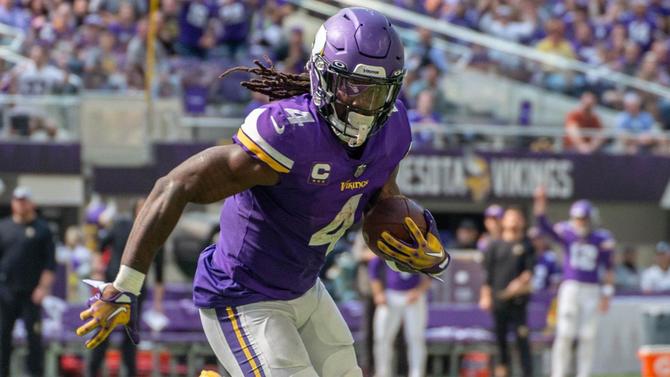
This would be the first step toward doing anything at QB. Some veterans are still due to be cut for cap savings; think pass rusher Za'Darius Smith, whose exit would free up at least $7M. Running back Dalvin Cook is another candidate to be moved, especially as he heals up from a lingering shoulder injury. Running mate Alexander Mattison is back on a $7M extension and perfectly capable of manning RB1 duties alongside a cheaper veteran/rookie. And then there are logical extensions for wide receiver Justin Jefferson and tight end T.J. Hockenson. Both will command top dollar, but inking them to long-term deals would save at least $7.5M in 2023, per Over the Cap. Unloading Cousins in a creative fashion would ideally also open up room.
Trading for Lamar Jackson
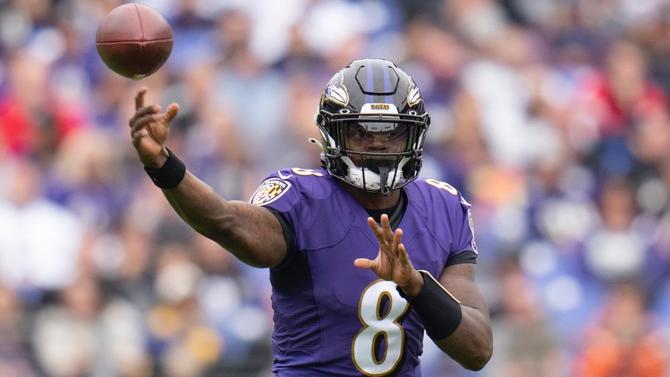
The Ravens star would not come cheap; in fact, he'd surely be even more expensive than Cousins. He's also got his own flaws, chiefly a recent injury history. But at 26, with an MVP under his belt and unteachable electricity, he could pair with Jefferson to give Minnesota two of the game's most explosive young playmakers. And, most importantly, he's available!
The Ravens can technically match any offer he gets as a free agent under the non-exclusive franchise tag, but Jackson's relationship with Baltimore is tinged with uncertainty. If somehow the Ravens let him walk via an offer sheet, the Vikings would be required to submit two first-round picks as compensation -- a potential bargain from Minnesota's eyes, if you're securing such a gifted young QB for the long haul. If the Ravens instead looked to move Jackson via a traditional trade, the cost would likely be higher -- two firsts, plus an additional pick and/or player -- but could also open the door for Cousins to be included in a swap.
Cousins wouldn't necessarily balk at a move to Baltimore, where John Harbaugh and Co. are proven contenders with a solid defense. How about the Vikings' 2023 first-rounder (No. 23), 2024 first-rounder, 2024 second-rounder and Cousins in exchange for Jackson?
It'd take some extra work, but going through a third party to bolster trade assets is also a possibility. Take the Titans, for example; they own the No. 11 pick this year. Perhaps they'd be interested in a Kirk Cousins rental, giving Mike Vrabel a steadier play-action replacement for the expensive, expendable Ryan Tannehill. Cousins could find Tennessee appealing, leaning on the run in a winnable division. If, say, the Vikings sent Cousins, the No. 23 pick and an extra late-rounder to the Titans to get No. 11, they could then dangle their new first-rounder to the Ravens for Jackson.
The Patriots could also be a lurking wild card in such a scenario, owning the No. 14 overall pick and maintaining some uncertainty at QB, where there's been internal debate about Mac Jones and Bailey Zappe as sustainable starters. You can envision Bill Belichick and Bill O'Brien admiring Cousins' steady, if unspectacular, resume for their old-school attack, especially if Belichick is getting impatient in a post-Tom Brady world. Getting their No. 14 pick would also make for a better Ravens offer.
Trading up for a rookie QB
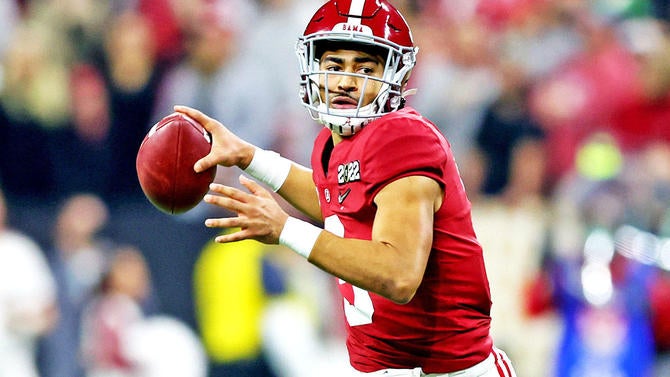
Months ago, you might've projected the Vikings taking a swing on the last remaining top QB prospect right at No. 23 overall. As per usual, however, the draft drawing near has catapulted some prospects' stock, most notably Florida's Anthony Richardson. Somebody like Tennessee's Hendon Hooker, an athletic but older prospect coming off injury, may well be available. But acquiring one of the consensus top four signal-callers will assuredly require a trade up.
We can assume that one of the top three -- Richardson, Ohio State's C.J. Stroud or Alabama's Bryce Young -- will go No. 1 to the Panthers. The Texans (No. 2) and Colts (No. 4) are also safe bets to go QB, provided Indianapolis doesn't pursue and land Lamar Jackson. That means the Vikings would likely have to get all the way to No. 3 to at least have a choice between multiple QB prospects. The current team in that spot, the Cardinals, should be motivated to sell while rebuilding around Kyler Murray, but the price tag would be exorbitant: probably No. 23, a 2024 first, 2024 second and at least another Day 2 pick or starting-caliber player. In that scenario, you'd hope to recoup at least a mid-round pick by shipping Cousins elsewhere.
If somehow one of the top names, like Young or Kentucky's Will Levis, slips further than expected, you might have trade partners in the Bears (No. 9), Eagles (No. 10), Jets (No. 13) or Packers (No. 15) -- all of whom either have current starting QBs or, in the Jets' case, figure to have one by then. Again, you'd be counting on moving Cousins to a separate team, which is easier said than done. The ultimate benefit, besides adding a potentially superior long-term talent, would be shifting to a rookie QB contract, which would theoretically enable the Vikings to better restock the supporting cast in 2024 and beyond.
Trading for Trey Lance
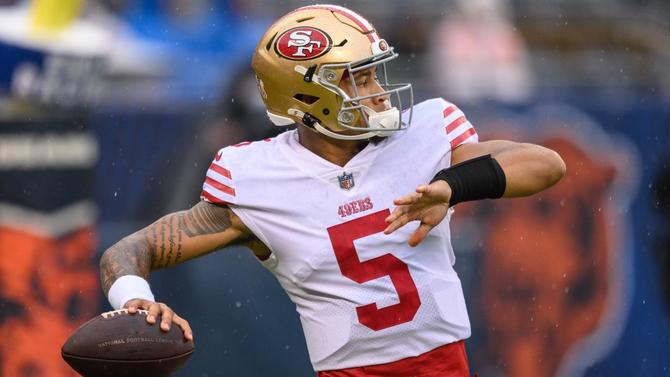
If the Vikings are intent on juicing up their QB upside for the short and long term, but both Jackson and a major first-round trade up don't pan out, Lance stands out as a bigger but perhaps more feasible gamble. A Minnesota native, the 49ers QB is a relative unknown after two injury-riddled NFL seasons, and it's unclear what his future holds once Brock Purdy, the Niners' improbable 2022 standout, returns to the field. He's also just 22 and two years removed from going No. 3 overall, boasting all the athletic traits you covet in a contemporary franchise QB.
The 49ers have been open about their exploration of veteran QBs in recent years, retaining Jimmy Garoppolo longer than expected, entertaining pursuits of Aaron Rodgers and Tom Brady, and most recently adding Sam Darnold as emergency insurance. Cousins, meanwhile, has a documented history with coach Kyle Shanahan from their days in Washington, and profiles as an ideal fit for his run-first, quick-strike attack. After cycling through QBs in recent years, who's to say Shanahan wouldn't embrace a reunion as he looks to return to the Super Bowl and get something for Lance while he still can?
From the Vikings' end, Lance is obviously much less of a sure thing than Cousins, registering as a mobile but unpolished passer. But again: He's young, he's cheap, and he's got certain tools that Cousins simply does not. It'd be a riskier bet from Adofo-Mensah, but it'd likely cost less than a move for Jackson or a top rookie, especially considering Cousins' potential value to the 49ers system.













